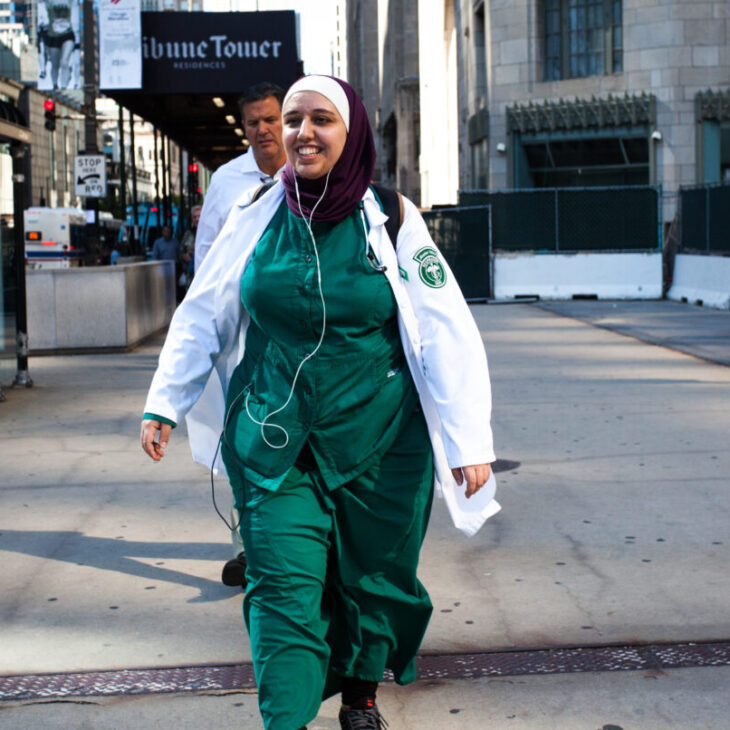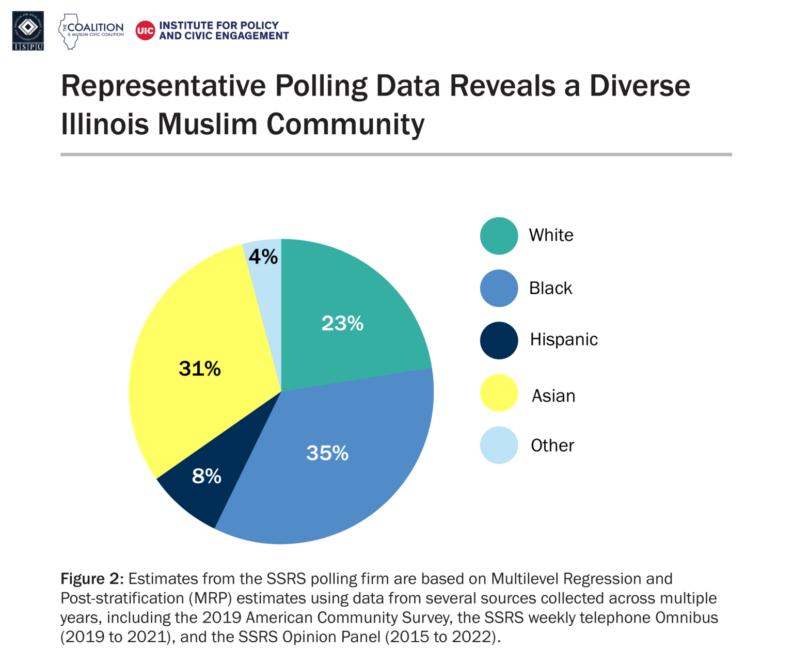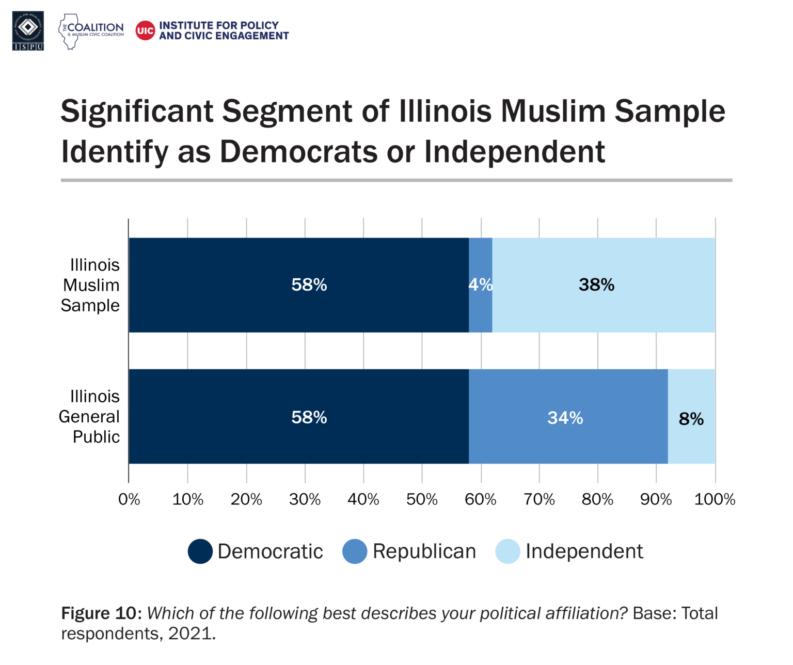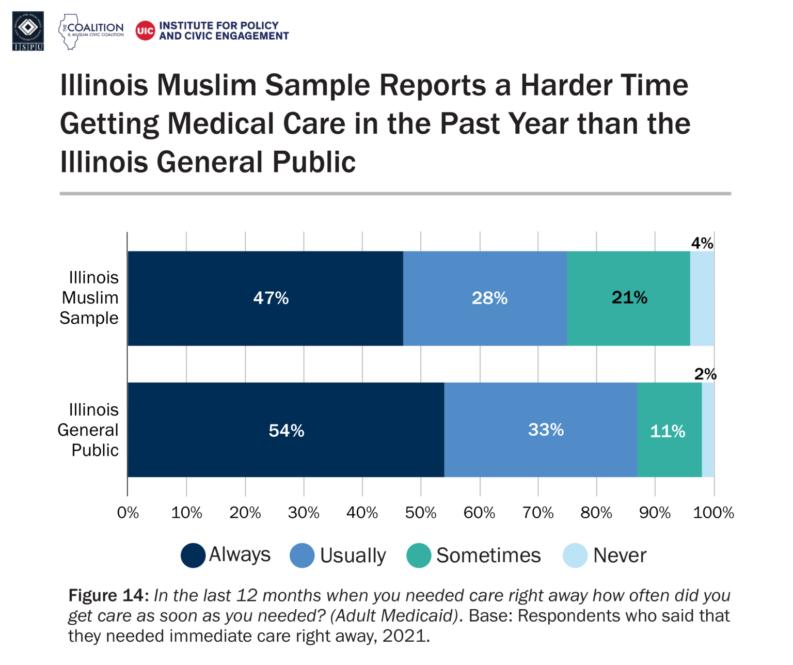Who are Illinois Muslims? New Study Shows They’re Diverse, Civic-Minded and Generous
July 28, 2022

A first-of-its-kind report on Muslims in Illinois found that 3 out of 4 are registered to vote, and an additional 16 percent expressed an interest to register, revealing high levels of civic engagement and opening the door for successful voter registration drives.
The report also highlights Muslims in Illinois are more politically independent, philanthropic and slightly more likely than the general public to report deeper civic engagement such as volunteering. Nearly 1 in 4 respondents reported volunteering for a political campaign in the past 12 months, compared to 17% of the general public. About 1 in 3 school-aged students said they didn’t have access to halal food at school.
The report – titled “Illinois Muslims: Needs, Assets, and Opportunities”— was convened and published by the Illinois Muslim Civic Coalition in partnership with the Institute for Policy and Civic Engagement at the University of Illinois Chicago and the Institute for Social Policy and Understanding, or ISPU, a think-tank based in Washington, D.C.
“Illinois has the largest per capita Muslim population in the entire nation,” says Reema Kamran, executive director and co-founder of the Illinois Muslim Civic Coalition. “We wanted to understand the diverse population that makes up the Illinois Muslim community, and make sure that we were uplifting our voices. We want the organizations that serve us to know our needs, and also to celebrate the contributions we make to the community.”
The study finds Illinois Muslims are young (50% are between the ages of 18 and 35), racially and ethnically diverse (23% non-Hispanic white, 35% non-Hispanic Black, 8% Hispanic, 31% Asian, and 4% non-Hispanic other) and more college educated (40%) compared to the general Illinois public (28%). Muslims in Illinois hold nearly 6% of the jobs in Illinois – around 350,000 – despite making up only 2.8% of the state’s population and facing high religious discrimination. Half of the respondents said they had faced discrimination based on their faith.
The report was developed after three years of research and preparation and presents an empirical assessment of the strengths and struggles of the Illinois Muslim community based on nearly 1,800 completed surveys collected from October 15, 2021, to January 31, 2022. The study also included a comparison to the Illinois general public and four focus groups.
“This report is not the end of this work. We will be using this to understand the community and make sure that we’re measuring the progress that we’re making,” Kamran says. “We will continue to build on this data, and hope this will serve as a replicable model that other states can also use to understand their underrepresented communities.”
Share
Related Articles
American Civic Life
American Civic Life
Eboo Patel and Wajahat Ali: Is “Interfaith America” Even Possible?
American Civic Life
Faith Based Efforts Work in Vaccine Uptake: Now Let’s Make it Easy

Key Highlights
- Faith: More than 4 in 5 Illinois Muslim respondents (84%) reported that their faith is very important to them; 72% attended their house of prayer once a month or more prior to the pandemic.
- Health Care: One-fifth (21%) of Muslim respondents said they needed immediate care in the last 12 months, but 25% of those who needed care stated they sometimes or nevergot care as soon as they needed it.
- Education: 40% of respondents in the Muslim sample have a college degree or higher, compared with 28% of the Illinois general public sample. Muslim respondents were a diverse talent pool, especially in the fields of healthcare, STEM, business, and education.
- Divorce: Despite only 11% of Muslim respondents saying they have ever been divorced, 91% greed that their faith community should be more supportive of divorced families.
- Halal Food: 39% of Muslim respondents with school-aged children and 32% of students enrolled in college said that they didn’t have access to halal food at their school, pointing to a need for administrators at grade schools and institutions of higher learning to work to address the religious dietary needs of their Muslim students.
- Discrimination: Roughly half of all respondents in the Illinois Muslim sample have faced religious discrimination (52%), compared to 24% of the Illinois general public sample.
- Philanthropy: 83% of Muslims donated to organizations or causes associated with their faith community in the past year, compared with 46% of the Illinois general public sample.
- Politics: Politically, 58% of the Muslim sample identify as Democratic, paralleling the Illinois general population, while 38% identify as independent in a state where only 8% claim this political description.
- Birthplace: More than 50% of Illinois Muslims were born in the United States, as opposed to 89% of the Illinois general public sample.
- Mosque opposition: More than one third of Muslims (39%) stated that they experienced significant resistance by the local community when trying to move, build, or expand their house of worship.
- Public support: A greater proportion of the Illinois Muslim sample (75%) stated that their faith community should provide more support to those struggling with addiction, compared with 53% of the Illinois general public sample.
- Mental health: Just 13% of the Muslim sample sought help from a licensed therapist in the year prior to the survey, compared to 24% of the Illinois general public. When asked about reasons for reluctance in seeking treatment, among respondents in the Illinois Muslim sample who reported symptoms of mental illness but did not seek treatment, 35% reported that it would be too expensive, 11% said they didn’t trust mental health professionals, and 10% said they would feel embarrassed.

The historic report also includes recommendations and opportunities for a range of stakeholders on how to address needs in Muslim communities. These include:
- Focus on racial equity by recognizing the racialized nature of Islamophobia and supporting efforts to combat it among the general public and within schools, hospitals, and other public and private institutions
- Partner with Muslim-led community organizations to provide halal options for Muslim students. Also note that all students can consume halal food, so switching to halal providers will address the needs of every student.
- Better understand and cater to the Muslim consumer who has strong disposable income and purchasing power.
- Invest in serving Muslims with disabilities, providing addiction prevention and treatment, supporting aging community members and their families, supporting divorcees, and addressing domestic violence and supporting victims
- Invest in and support specialized faith, social, and civic organizations to address specific needs. The Muslim community is large and diverse, and one or few organizations can no longer meet every need. There is no one voice in this diverse community, so intra-community collaboration and coalition building is critical between races, ethnicities, genders, etc.
Read the full report and recommendations.




